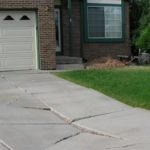How Long Does Concrete Leveling Last?
 Concrete leveling using polyurethane foam, a process known as “poly jacking” or “poly leveling,” is a powerful and versatile technique for leveling slabs and foundations in homes and other buildings. It is commonly used to repair sidewalks, driveways, patios, pool decks, and other surfaces where uneven or sunken concrete can pose a safety hazard.
Concrete leveling using polyurethane foam, a process known as “poly jacking” or “poly leveling,” is a powerful and versatile technique for leveling slabs and foundations in homes and other buildings. It is commonly used to repair sidewalks, driveways, patios, pool decks, and other surfaces where uneven or sunken concrete can pose a safety hazard.
While concrete leveling has many benefits over alternatives such as ripping out and replacing old concrete, we understand that it is still an investment. That’s why many home and business owners want to know how long this solution will last. Keep reading to learn more and contact Quantum for concrete leveling in Vancouver or nearby areas today.
Understanding the Basics of Concrete Leveling
The concrete leveling process begins with identifying the problem areas on the concrete surface. Once these areas are identified, small holes are drilled into the slab to inject the polyurethane foam underneath it. The foam expands rapidly when it comes in contact with soil moisture, lifting up the slab until it reaches the desired level. This process can be completed quickly since most of the work takes place beneath the slab’s surface.
Poly jacking has many advantages over traditional mud jacking techniques. Since it only requires small holes to be drilled into the slab, there’s far less disruption that needs to be done on-site in comparison to other methods like slab piers or steel post installations which require excavating around your property. Additionally, because of its quick-expanding properties, poly jacking works faster than any other type of repair method available for leveling concrete slabs and foundations.
Overall, understanding how to use polyurethane foam for concrete leveling can help you make sure that your project goes smoothly and safely from start to finish without compromising results.
The Benefits of Concrete Leveling
Concrete leveling is an important part of maintaining a safe and well-kept home or commercial business. Whether it is to level a driveway, sidewalk, patio, or other structure, this process can help restore the look and feel of your property or area. With concrete leveling, you can reduce trip hazards and the risk of falls which can provide both safety benefits for people using the space as well as save you time and money in the long run with less upkeep needed.
Concrete leveling also provides improved drainage for areas prone to pooling water due to uneven ground. This not only helps prevent flooding in your yard or building but also prevents ice accumulation in winter months that could create hazardous conditions on walkways and driveways. In addition, leveling with polyurethane foam can help increase the value of your property by creating a more attractive environment which can be a major selling point when you decide to put your home on the market.
Finally, as mentioned above, any slab repair work done with polyurethane foam is highly cost-effective in comparison to other methods such as digging up large sections of concrete or replacing slabs entirely. It requires minimal disruption of the site and very little manual labor involved so costs are kept low while still providing excellent results.
Overall, concrete leveling with polyurethane foam is one of the most beneficial ways to ensure that your property stays level and safe over time while providing aesthetic advantages and increasing its value at the same time.
How Long Does Concrete Leveling Last
Concrete leveling is a process that can restore a level surface to an uneven slab and help make your home or commercial business safer, more attractive, and value-boosting. But like all construction jobs, it’s important to understand how long the work will last before you take on the project. While traditional mud jacking can last anywhere from 1-20 years depending on soil conditions and other variables, polyurethane foam concrete leveling can offer superior performance with a longer estimated lifespan of up to 25 years with proper maintenance.
The reason why poly jacking lasts longer than other methods is that it lifts and stabilizes slabs in smaller increments over a larger area at once. By filling the space below with expanding foam instead of mud or water, it creates an even stronger bond between the concrete slab and substrate which prevents future settling for long periods of time. The material also holds its shape better which helps protect against erosion over time as well as prevent gaps from forming where weeds or roots could take root and cause further damage.
Polyurethane foam concrete leveling also comes with another benefit – if minor settlement does occur over a long period of time, the process can often be repeated to fill any voids without having to completely redo the lifting job again. This helps extend the life of your project without having to invest too much money down the line.
How to Make Concrete Leveling Last Longer
Although concrete leveling can last up to 25 years with proper maintenance, there are a few steps you can take to ensure that it lasts even longer. The first step is to make sure the existing soil and concrete slab are in good condition before beginning the leveling project. This means checking for cracks, voids, or other signs of damage and getting them repaired if necessary.
It’s also important to keep an eye on any changes in drainage patterns or elevation that could affect the lifespan of your concrete leveling job over time. If you notice pooling of water around the edges of your driveway or sidewalks, use gravel or stones to create a more efficient runoff system in order to keep groundwater levels low and prevent further erosion.
On top of regular inspection, sealing your concrete slab at least once a year after leveling can also help increase its lifespan. A good sealant will protect against extreme temperature changes as well as water absorption which reduces the risk of new settling over time. It’s also recommended that you regularly wash away dirt and debris build-up from the surface as this can cause discoloration and staining which could lead to premature wear and tear on the material eventually.
Finally, don’t forget about any potential hazards such as sharp edges, cracks, or raised nails that could be present on your slabs – these should be taken care of immediately in order to reduce the risk of injury while using the area.
By following these simple steps, you can ensure that your concrete leveling job lasts for years without having to worry about costly repairs down the road.
Tips for Hiring a Professional to Do Concrete Leveling
If you’re considering concrete leveling in Vancouver, then hiring Quantum Concrete Leveling is a great choice for your project. We specialize in polyurethane foam concrete leveling which has a longer estimated lifespan with proper maintenance and is also non-invasive so that it won’t disrupt landscaping or other structures around your property.
Our team at Quantum also provides superior customer service with free consultations and guarantees on their workmanship. Our use of advanced technology allows for fast, reliable, and secure results which helps ensure the job is done quickly and correctly from start to finish. Plus, our technicians are trained to inspect each area thoroughly before we start the process to make sure everything is in order.
Overall, choosing Quantum Concrete Leveling will give you peace of mind knowing that you’re investing in a quality solution that not only offers lasting value but can be completed with minimal disruption to yourself or your neighbors. Click here to learn more and to schedule your Vancouver concrete leveling project today.
By David Sorokovsky, owner of Quantum Concrete Leveling
David Sorokovsky is the proud owner of Quantum Concrete Leveling in Vancouver. When it comes to concrete leveling in Western Canada, homeowners, building owners, and public entities trust Quantum Concrete Leveling to deliver expert services. From mudjacking to poly leveling (or “polyjacking”) and void filling, our team utilizes the latest techniques and uses a durable, long-lasting foam material to raise and level uneven concrete surfaces such as sidewalks, garage floors, driveways, concrete steps, warehouse floors and even concrete foundations on homes and buildings. To learn more, browse our website or give us a call today.


